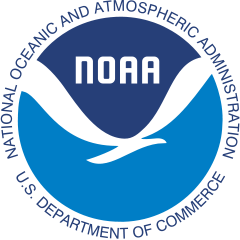Decadal Climate Variability, Predictability, and the Atlantic Meridional Overturning Circulation
Background
On regional scales and for periods of a decade or two, natural climate variability has an impact comparable to greenhouse gas induced climate change. These impacts include decadal-scale changes in drought and extreme weather events, including hurricanes. Thus, it is crucial to understand the mechanisms and climatic relevance of decadal variability, and to assess whether such decadal variability is predictable. Furthering our understanding of decadal variability also enhances our ability to differentiate human-induced climate change from natural climate variability.
This project looks at decadal variability and predictability from a global perspective, but with special emphasis on the Atlantic Meridional Overturning Circulation (AMOC). The AMOC is a northward flow of warm, salty water in the upper layers of the Atlantic, and a southward flow of colder waters in the deep Atlantic. Since this circulation transports a substantial amount of heat from the Tropics to higher latitudes, fluctuations in this circulation can have a profound impact on climate. Previous work has linked AMOC changes to Indian and African monsoon rainfall, hurricanes in the Atlantic, and summertime temperature and rainfall over North America and Europe. It has also played an important role in past abrupt climate changes, such as those that occurred during the ending of the Last Ice Age approximately 8,000 to 13,000 years ago. A recent CCSP report examines the possibility of future abrupt change in the AMOC.
Current Research Efforts and Plans:
Efforts in this project seek to better understand the mechanisms of decadal climate variability and to assess whether such variability may be predictable through the use of both statistical tools and advanced computer climate models. In particular, major research efforts are underway to:
- evaluate the mechanisms of decadal climate variability, including the AMOC, and their climatic impact
- estimate the inherent decadal scale predictability of the climate system in general, and the AMOC in particular
- develop advanced coupled assimilation systems to initialize coupled climate models for decadal predictions
- develop high resolution coupled models to assess decadal variability and predictability
- develop protoype decadal prediction system
In addition, we are currently performing climate model experiments in support of the IPCC Fifth Assessment Report (AR5, scheduled for completion in 2013). These experiment will follow an internationally accepted protocol, and output from these experiments will be made publicly available on our GFDL data portal. These experiments will start from the observed state of the climate system, and evaluate predictive skill on decadal time scales. We conduct these experiments using the GFDL CM2.1 climate model, with initial conditions from the GFDL coupled assimilation system. We conduct a 10 member ensemble of 10-year predictions starting every January from 1971 to 2011.
External Links
Related Publications
Zhang, Shoaqing, Anthony Rosati, and Matthew J Harrison, in press: Detection of multi-decadal oceanic variability within a coupled ensemble data assimilation system. Journal of Geophysical Research.
Zhang, Rong, and Thomas L Delworth, in press: A new method for attributing climate variations over the Atlantic Hurricane Basin’s main development region. Geophysical Research Letters.
Chang, Y-S, Anthony Rosati, Shoaqing Zhang, and Matthew J Harrison, in press: Objective analysis of monthly temperature and salinity for the world ocean in the 21st Century: Comparison with WOA and application to assimilation model. Journal of Geophysical Research.
Delworth, Thomas L., and Rong Zhang, et al., December 2008: The potential for abrupt change in the Atlantic Meridional Overturning Circulation In Abrupt Climate Change: Final Report, Synthesis & Assessment Product 3.4, CSSP, Reston, VA, U.S. Geological Survey, 258-359. PDF
Delworth, Thomas L., and Fanrong Zeng, October 2008: Simulated impact of altered Southern Hemisphere winds on the Atlantic Meridional Overturning Circulation. Geophysical Research Letters, 35, L20708, doi:10.1029/2008GL035166. PDF
Zhang, Rong, October 2008: Coherent surface-subsurface fingerprint of the Atlantic meridional overturning circulation. Geophysical Research Letters, 35, L20705, doi:10.1029/2008GL035463. PDF
Zhang, Shoaqing, Matthew J Harrison, Anthony Rosati, and Andrew T Wittenberg, 2007: System Design and Evaluation of Coupled Ensemble Data Assimilation for Global Oceanic Climate Studies. Monthly Weather Review, 135(10), 3541-3564. PDF
Zhang, Rong, Thomas L Delworth, and Isaac Held, 2007: Can the Atlantic Ocean drive the observed multidecadal variability in Northern Hemisphere mean temperature? Geophysical Research Letters, 34, L02709, doi:10.1029/2006GL028683. PDF
Zhang, Rong, 2007: Anticorrelated multidecadal variations between surface and subsurface tropical North Atlantic. Geophysical Research Letters, 34, L12713, doi:10.1029/2007GL030225. PDF
Zhang, Rong, and Thomas L Delworth, December 2007: Impact of the Atlantic Multidecadal Oscillation on North Pacific climate variability. Geophysical Research Letters, 34, L23708, doi:10.1029/2007GL031601. PDF
Delworth, Thomas L., and Keith W Dixon, 2006: Have anthropogenic aerosols delayed a greenhouse gas-induced weakening of the North Atlantic thermohaline circulation? Geophysical Research Letters, 33(2), L02606, doi:10.1029/2005GL024980. PDF


